These archive pages are provided in order to make it easier for you to find items
that you remember seeing on the Airplanes and Rockets homepage. Of course probably
the easiest way to find anything on the website is to use the "Search AAR" box at
the top of every page.
1 |
2 |
3 |
4 |
5 |
6 |
7 |
8 |
9 |
10 |
11 |
12 |
13 |
14 |
15 |
16 |
17 |
18 |
19 |
20
21 |
22 |
23 |
24 |
25 |
26 |
27 |
28 |
29 |
30 |
31 |
32 |
33 |
34 |
35 |
36 | 37
| 38 | 39
 Wives poking fun at their hobby-obsessed
husbands is not a new thing. Good-natured articles contributed by wives have appeared
in all kinds of specialty magazines for decades. This one entitled "Why
Not Authentic, Prefabricated Husbands?" was written by the wife of a model airplane,
rocket, and boat builder. Her name is Laurie Cunningham, which makes me wonder if
she is the better half of Chuck Cunningham, who wrote the "Cunningham on R/C" column
for R/C Modeler magazine for many years. Mrs. Cunningham's experience is not
unlike my own wife's (Melanie) dilemma living with me going on four decades. Throughout
our house on display are Estes rocket models, plastic and balsa model airplanes
and boats, and even a helicopter or two. Most of them are ones I've never flown
or floated for fear of messing up the carefully applied finish. Fortunately, the
in-service models are now all electric so there is not a mess of glow fuel dripping
onto the floor - just an occasional tire mark on the wall. In exchange for her tolerance... Wives poking fun at their hobby-obsessed
husbands is not a new thing. Good-natured articles contributed by wives have appeared
in all kinds of specialty magazines for decades. This one entitled "Why
Not Authentic, Prefabricated Husbands?" was written by the wife of a model airplane,
rocket, and boat builder. Her name is Laurie Cunningham, which makes me wonder if
she is the better half of Chuck Cunningham, who wrote the "Cunningham on R/C" column
for R/C Modeler magazine for many years. Mrs. Cunningham's experience is not
unlike my own wife's (Melanie) dilemma living with me going on four decades. Throughout
our house on display are Estes rocket models, plastic and balsa model airplanes
and boats, and even a helicopter or two. Most of them are ones I've never flown
or floated for fear of messing up the carefully applied finish. Fortunately, the
in-service models are now all electric so there is not a mess of glow fuel dripping
onto the floor - just an occasional tire mark on the wall. In exchange for her tolerance...
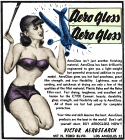 Just as with the Douglas Model Distributors
ad appearing on the same page of the September 1949 issue of Air Trails
magazine, you can see how marketing people knew how to get the attention of men
and boys. Victor Aerosearch ("aerosearch" possibly being an allusion to "aeronautical
research"?), maker of the very popular (at the time) AeroGloss hot fuel-proof dope,
employed the same eye-catching technique. Of course both companies leveraged the
dual meaning of the word "model" to their advantage. Some people like to say you
only need to use an attractive model to get people to notice your product if the
product is not attractive enough on its own to garner interest. Others say the girl
serves two purposes - to get the attention of men in the business and to suggest
that if you use this particular product, you will naturally draw the attention of
girls who look like the one in the ad. Both arguments have merit, but I'm guessing
the most prevalent one is the latter rather than the former. Just as with the Douglas Model Distributors
ad appearing on the same page of the September 1949 issue of Air Trails
magazine, you can see how marketing people knew how to get the attention of men
and boys. Victor Aerosearch ("aerosearch" possibly being an allusion to "aeronautical
research"?), maker of the very popular (at the time) AeroGloss hot fuel-proof dope,
employed the same eye-catching technique. Of course both companies leveraged the
dual meaning of the word "model" to their advantage. Some people like to say you
only need to use an attractive model to get people to notice your product if the
product is not attractive enough on its own to garner interest. Others say the girl
serves two purposes - to get the attention of men in the business and to suggest
that if you use this particular product, you will naturally draw the attention of
girls who look like the one in the ad. Both arguments have merit, but I'm guessing
the most prevalent one is the latter rather than the former.
 Call me a hopeless nostalgist when it comes
to favored institutions I grew up with. I miss Pontiac dealerships, Montgomery Ward,
and Radio Shack stores. I miss Uncle Ben on the converted rice package, and the
Indian squaw on the Land O'Lakes margarine package. I miss trips to Blockbuster
Video stores on Saturday to pick up a movie on VHS tape, and walking through Toys
R Us during the Christmas season. General Foods, Woolworth, Eastern Airlines, Circuit
City, Western Auto, Drug Fair, Read's Drug, Britt's Department Stores, Lafayette
Radio, A&P Grocery, Northern Reflections, Hechinger Home Improvement, and Babbage's
Software. All those and more were part of my growing up in the Annapolis, Maryland
area (with Parole Plaza being the prime shopping complex in the era). One of the
things I miss the most is the old
Sear,
Roebuck and Co. stores - particularly the Craftsman tools and lawn and garden
sections. My parents bought just about everything from Sears, from us kids' (five
of us) school clothing, to household appliances, to lawn mowers, to furniture. Sears'
Open Hearth sofas, chairs, end tables, etc. (pretty sure we had this), were nice
wood and cloth designs which wore well and were fairly inexpensive. Of course the
Sears Wish Book and Montgomery Ward Christmas catalogs... Call me a hopeless nostalgist when it comes
to favored institutions I grew up with. I miss Pontiac dealerships, Montgomery Ward,
and Radio Shack stores. I miss Uncle Ben on the converted rice package, and the
Indian squaw on the Land O'Lakes margarine package. I miss trips to Blockbuster
Video stores on Saturday to pick up a movie on VHS tape, and walking through Toys
R Us during the Christmas season. General Foods, Woolworth, Eastern Airlines, Circuit
City, Western Auto, Drug Fair, Read's Drug, Britt's Department Stores, Lafayette
Radio, A&P Grocery, Northern Reflections, Hechinger Home Improvement, and Babbage's
Software. All those and more were part of my growing up in the Annapolis, Maryland
area (with Parole Plaza being the prime shopping complex in the era). One of the
things I miss the most is the old
Sear,
Roebuck and Co. stores - particularly the Craftsman tools and lawn and garden
sections. My parents bought just about everything from Sears, from us kids' (five
of us) school clothing, to household appliances, to lawn mowers, to furniture. Sears'
Open Hearth sofas, chairs, end tables, etc. (pretty sure we had this), were nice
wood and cloth designs which wore well and were fairly inexpensive. Of course the
Sears Wish Book and Montgomery Ward Christmas catalogs...
 In looking at this advertisement by
Douglas Model Distributors in the September 1949 issue of Air Trails
magazine, you might wonder what type of models Douglas was distributing. Of course
if you want to sell products and service to men (and boys), one of the best gimmicks
to use is a pretty - and shapely - girl (see the AeroGloss ad also on the page).
Marketeers have been onto that angle since the dawn of civilization. The company
was located in Salt Lake City, Utah, at the time of this advertisement, but a search
for Douglas Model Distributors shows they are now (if it is the same company) set
up in Liberty, Missouri. On their webpage there is a note about their retail distributor
business called Sprue Brothers Models, which is funny because a "sprue" is the little
section of plastic on a model kit injection molded parts tree that connects the
parts to the tree. I'm guessing the company name is a play on the process... In looking at this advertisement by
Douglas Model Distributors in the September 1949 issue of Air Trails
magazine, you might wonder what type of models Douglas was distributing. Of course
if you want to sell products and service to men (and boys), one of the best gimmicks
to use is a pretty - and shapely - girl (see the AeroGloss ad also on the page).
Marketeers have been onto that angle since the dawn of civilization. The company
was located in Salt Lake City, Utah, at the time of this advertisement, but a search
for Douglas Model Distributors shows they are now (if it is the same company) set
up in Liberty, Missouri. On their webpage there is a note about their retail distributor
business called Sprue Brothers Models, which is funny because a "sprue" is the little
section of plastic on a model kit injection molded parts tree that connects the
parts to the tree. I'm guessing the company name is a play on the process...
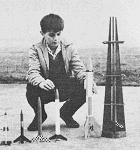 "Red birds are much like our own." That
was written of a Ruskie publication reporting on a model rocketry contest in the
USSR. Of course, this story is from a 1963 edition of American Modeler.
Back then Communists (Russians, Chinese, North Koreans, etc.) were colloquially
referred to as "Reds". The main topic of the article, though , is the growing popularity
of rocket boost gliders. A few attempts have been made over the years to try rocket
boost R/C models, but without much success. Also covered is the obstacle being faced
by groups trying to recruit new rocketeers because of the "killer" reputation
homemade model rocket engines
had acquired from careless and/or ignorant handling of the explosive components.
Vernon Estes single-handedly changed the fate of the model rocket hobby by introducing
preloaded, solid propellant motors... "Red birds are much like our own." That
was written of a Ruskie publication reporting on a model rocketry contest in the
USSR. Of course, this story is from a 1963 edition of American Modeler.
Back then Communists (Russians, Chinese, North Koreans, etc.) were colloquially
referred to as "Reds". The main topic of the article, though , is the growing popularity
of rocket boost gliders. A few attempts have been made over the years to try rocket
boost R/C models, but without much success. Also covered is the obstacle being faced
by groups trying to recruit new rocketeers because of the "killer" reputation
homemade model rocket engines
had acquired from careless and/or ignorant handling of the explosive components.
Vernon Estes single-handedly changed the fate of the model rocket hobby by introducing
preloaded, solid propellant motors...
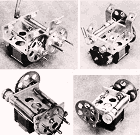 Glass-filled nylon and other types of high
strength plastic for gears and structural components were things of the future in
1962 - about a decade or so at least - when this article appeared in a 1962 issue
of American Modeler magazine. Likewise for
high torque, miniature motors that used powerful rare earth magnets - at least
at a price affordable to hobbyists. Not only were early servos big and heavy, but
they drew a lot of current from the airborne battery, were slow, and were driven
by analog proportional circuits (i.e., low positional precision). Servos available
today are modern marvels of materials, mechanical, and electrical engineering. While
it was not too hard to imagine in the 1950s and 1960s how a servo might be improved
over the (then) state of the art, it is hard to imagine how the ones we have today
could be significantly better, at least in terms of how any further improvement
would greatly benefit radio controlled flying models... Glass-filled nylon and other types of high
strength plastic for gears and structural components were things of the future in
1962 - about a decade or so at least - when this article appeared in a 1962 issue
of American Modeler magazine. Likewise for
high torque, miniature motors that used powerful rare earth magnets - at least
at a price affordable to hobbyists. Not only were early servos big and heavy, but
they drew a lot of current from the airborne battery, were slow, and were driven
by analog proportional circuits (i.e., low positional precision). Servos available
today are modern marvels of materials, mechanical, and electrical engineering. While
it was not too hard to imagine in the 1950s and 1960s how a servo might be improved
over the (then) state of the art, it is hard to imagine how the ones we have today
could be significantly better, at least in terms of how any further improvement
would greatly benefit radio controlled flying models...
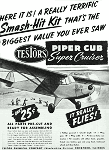 Cox is undoubtedly was the world's largest
manufacturer of ready-to-fly control-line model airplanes. Nearly all used some
form of their equally famous .049 glow fuel engine. A couple used the .020 engine.
Back in the 1960s through probably the 1980s, most kids who learned to fly control
line did so with a Cox model - most notably the Cox PT-19 Trainer, which is the
one with which I learned to fly. The other contender for control line flyers was
Testors, famous in its own right for model dope, enamel spray and brush-on paint,
and glow fuel, also produced a few ready-to-fly control line models. Both Cox and
Testors used molded plastic construction. This advertisement from a 1949 issue of
Air Trails magazine pitches a stick and tissue free flight kit for a
Piper Cub Super Cruiser model. That 25¢ price in 1949 is the equivalent of $2.97
in 2022 money (a 12x increase), with is still way less that you would pay for a
kit of that type today... Cox is undoubtedly was the world's largest
manufacturer of ready-to-fly control-line model airplanes. Nearly all used some
form of their equally famous .049 glow fuel engine. A couple used the .020 engine.
Back in the 1960s through probably the 1980s, most kids who learned to fly control
line did so with a Cox model - most notably the Cox PT-19 Trainer, which is the
one with which I learned to fly. The other contender for control line flyers was
Testors, famous in its own right for model dope, enamel spray and brush-on paint,
and glow fuel, also produced a few ready-to-fly control line models. Both Cox and
Testors used molded plastic construction. This advertisement from a 1949 issue of
Air Trails magazine pitches a stick and tissue free flight kit for a
Piper Cub Super Cruiser model. That 25¢ price in 1949 is the equivalent of $2.97
in 2022 money (a 12x increase), with is still way less that you would pay for a
kit of that type today...
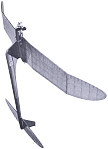 The "Ephemeris" Class A and FAI
free flight model was somewhat of a sensation in the modeling world back in 1963
when it appeared in the March/April issue of American Modeler magazine because it
featured up thrust. Its designer, R. Jess Krieser, was "thinking outside the box"
before the term was even coined. Mr. Krieser took an engineering approach to redesigning
the Carl Goldberg "Sailplane" model and after examining tables and graphs on L/D
curves on airfoil drag coefficients, settled on the final form factor that became
the Ephemeris. Read about it here... The "Ephemeris" Class A and FAI
free flight model was somewhat of a sensation in the modeling world back in 1963
when it appeared in the March/April issue of American Modeler magazine because it
featured up thrust. Its designer, R. Jess Krieser, was "thinking outside the box"
before the term was even coined. Mr. Krieser took an engineering approach to redesigning
the Carl Goldberg "Sailplane" model and after examining tables and graphs on L/D
curves on airfoil drag coefficients, settled on the final form factor that became
the Ephemeris. Read about it here...
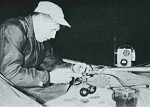 As with most electrical and electronic equipment,
performance increases have come often and significantly in the six and a half decades
wince the article was written. In 1957 when this article appeared in American
Modeler magazine,
battery
technology was still crude by today's standards, but much advancement had been
accomplished during the war years of WWII and Korea for the sake of field portable
communications gear. Chemistry and packaging improved to where if the user was knowledgeable
and applied certain precautions, a high degree of reliability could be garnered
from various cell types. Having the right battery for the task at hand was and still
is paramount to achieving success. It is interesting that vibrator type DC-to-AC
power supplies were still being used to supply the high plate voltage for electron
tubes. Some higher voltage batteries could be connected in series instead, but that
often resulted in too heavy and too bulky packs that could not be readily accommodated
by the airplane model... As with most electrical and electronic equipment,
performance increases have come often and significantly in the six and a half decades
wince the article was written. In 1957 when this article appeared in American
Modeler magazine,
battery
technology was still crude by today's standards, but much advancement had been
accomplished during the war years of WWII and Korea for the sake of field portable
communications gear. Chemistry and packaging improved to where if the user was knowledgeable
and applied certain precautions, a high degree of reliability could be garnered
from various cell types. Having the right battery for the task at hand was and still
is paramount to achieving success. It is interesting that vibrator type DC-to-AC
power supplies were still being used to supply the high plate voltage for electron
tubes. Some higher voltage batteries could be connected in series instead, but that
often resulted in too heavy and too bulky packs that could not be readily accommodated
by the airplane model...
 "After years of delay, NASA plans to roll
its massive new
Artemis SLS moon rocket out of the historic Vehicle Assembly Building and onto
it's launch pad for the first time Thursday. The rollout will be the first time
a NASA rocket so large -- 322 feet tall -- has moved to a launch pad since Apollo
17's Saturn V rocket did so before launching astronauts to the moon in 1972.
Space shuttles also made the same roll from the VAB to the launch pad from 1981
to 2011, but the new moon rocket will tower above the shuttle height, which was
184 feet when stacked on its large exterior fuel tank..." "After years of delay, NASA plans to roll
its massive new
Artemis SLS moon rocket out of the historic Vehicle Assembly Building and onto
it's launch pad for the first time Thursday. The rollout will be the first time
a NASA rocket so large -- 322 feet tall -- has moved to a launch pad since Apollo
17's Saturn V rocket did so before launching astronauts to the moon in 1972.
Space shuttles also made the same roll from the VAB to the launch pad from 1981
to 2011, but the new moon rocket will tower above the shuttle height, which was
184 feet when stacked on its large exterior fuel tank..."
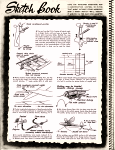 This "Sketch
Book" collection of handy tips appeared in the September 1949 issue of Air Trails
magazine. The monthly series ran for many years, as you can see from the big list
of other Sketch Book (aka Sketchbook) features at the bottom the the page. One of
the more technical tips has to do with locating the center of lateral area (CLA)
of a model. The author does not mention that it is important to make sure the model
profile cut from cardboard can rotate freely on the pin (or nail) so that gravity
will have it settle in the correct position. Otherwise, the location of the weighted
string relative to the model profile will not be accurate. With the tip for remotely
locating the engine needle valve, the magazine editor seems to be a bit dubious
about the scheme, and asks, "How about it, experts - think it'll work?" Since then
a number of glow fuel engines have been made with essentially that scheme, so it
must be feasible... This "Sketch
Book" collection of handy tips appeared in the September 1949 issue of Air Trails
magazine. The monthly series ran for many years, as you can see from the big list
of other Sketch Book (aka Sketchbook) features at the bottom the the page. One of
the more technical tips has to do with locating the center of lateral area (CLA)
of a model. The author does not mention that it is important to make sure the model
profile cut from cardboard can rotate freely on the pin (or nail) so that gravity
will have it settle in the correct position. Otherwise, the location of the weighted
string relative to the model profile will not be accurate. With the tip for remotely
locating the engine needle valve, the magazine editor seems to be a bit dubious
about the scheme, and asks, "How about it, experts - think it'll work?" Since then
a number of glow fuel engines have been made with essentially that scheme, so it
must be feasible...
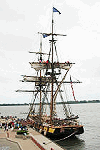 On July 3, 2009, Melanie and I treated our
daughter, Sally, and her husband, Matt, to a day sail adventure aboard the
Flagship Niagara, based here in
her home port of Erie, Pennsylvania. The day was perfect, with winds at around 10
knots on Lake Erie, temperatures were in the mid 70s, and an overcast sky that kept
the sweat factor to a minimum. We set sail from Dobbins Landing, which is next-door
to the Brig Niagara's home dock at the Erie Maritime Museum. Pictures of our adventure
are below, and a nice overview video produced by Edinboro University of Pennsylvania
is at the bottom. There is also a video I made of an actual cannon firing demonstration.
Captain Walter Rybka was in command. From the ship's website: "Flagship of the Commonwealth
of Pennsylvania, the Flagship Niagara is also a major museum "exhibit" when in homeport.
The Niagara in Erie, Pennsylvania, is a reproduction of the relief flagship of Commodore
Oliver Hazard Perry in a major naval battle of the War of 1812. On September 10,
1813, nine small ships... On July 3, 2009, Melanie and I treated our
daughter, Sally, and her husband, Matt, to a day sail adventure aboard the
Flagship Niagara, based here in
her home port of Erie, Pennsylvania. The day was perfect, with winds at around 10
knots on Lake Erie, temperatures were in the mid 70s, and an overcast sky that kept
the sweat factor to a minimum. We set sail from Dobbins Landing, which is next-door
to the Brig Niagara's home dock at the Erie Maritime Museum. Pictures of our adventure
are below, and a nice overview video produced by Edinboro University of Pennsylvania
is at the bottom. There is also a video I made of an actual cannon firing demonstration.
Captain Walter Rybka was in command. From the ship's website: "Flagship of the Commonwealth
of Pennsylvania, the Flagship Niagara is also a major museum "exhibit" when in homeport.
The Niagara in Erie, Pennsylvania, is a reproduction of the relief flagship of Commodore
Oliver Hazard Perry in a major naval battle of the War of 1812. On September 10,
1813, nine small ships...
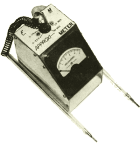 Here is an example of just how far we have
come in the realm of electronics. In a world where you can go to Harbor Freight
and buy a digital multimeter with
an accuracy of 1% or better for a mere $3, this article from the July 1958 edition
of Flying Models illustrates the dedication that was necessary in order
to outfit yourself with even the most fundamental tools for flying radio control
airplanes. It was part of era where building your own electronic device was less
expensive than buying one prefabricated. Such was the case for the aircraft radios,
too, as evidenced by the number of advertisements in magazines of the day for kits.
As is often true, there are good and bad aspects of building versus buying. Building
gives you the intricate knowledge of how everything goes together and functions
along with actually using the stuff you build. However, the ability to buy your
equipment pre-built leaves more time for honing flying skills... Here is an example of just how far we have
come in the realm of electronics. In a world where you can go to Harbor Freight
and buy a digital multimeter with
an accuracy of 1% or better for a mere $3, this article from the July 1958 edition
of Flying Models illustrates the dedication that was necessary in order
to outfit yourself with even the most fundamental tools for flying radio control
airplanes. It was part of era where building your own electronic device was less
expensive than buying one prefabricated. Such was the case for the aircraft radios,
too, as evidenced by the number of advertisements in magazines of the day for kits.
As is often true, there are good and bad aspects of building versus buying. Building
gives you the intricate knowledge of how everything goes together and functions
along with actually using the stuff you build. However, the ability to buy your
equipment pre-built leaves more time for honing flying skills...
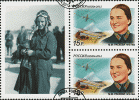 "A stamp printed by Russia which shows Marina
Raskova, a Soviet pilot- and the commander of the
'Night Witches.' Stories of heroes with almost superhuman abilities are not
new aerial combat. During World War II, German soldiers on the Russian Front talked
about supernatural women pilots who terrorized them on the front lines. At the time,
women were banned from combat. However, when Adolf Hitler launched the offensive
against Russia, Major Marina Raskova - the first woman in the Soviet Union to earn
national attention as a pilot, navigator, and aviation record-setter - approached
Joseph Stalin with the suggestion of training women for aerial combat. The 588th
Night Bomber Regiment, known later as the 46th 'Taman' Guards Night Bomber Aviation
Regiment, of the Soviet Air Force..." "A stamp printed by Russia which shows Marina
Raskova, a Soviet pilot- and the commander of the
'Night Witches.' Stories of heroes with almost superhuman abilities are not
new aerial combat. During World War II, German soldiers on the Russian Front talked
about supernatural women pilots who terrorized them on the front lines. At the time,
women were banned from combat. However, when Adolf Hitler launched the offensive
against Russia, Major Marina Raskova - the first woman in the Soviet Union to earn
national attention as a pilot, navigator, and aviation record-setter - approached
Joseph Stalin with the suggestion of training women for aerial combat. The 588th
Night Bomber Regiment, known later as the 46th 'Taman' Guards Night Bomber Aviation
Regiment, of the Soviet Air Force..."
 "Many
coronal
loops - ropey strands of plasma that scientists have long thought existed in
the Sun's atmosphere - may actually be optical illusions, according to a new paper
that challenges prevailing assumptions of what we know, and don't know, about the
Sun. The research, led by the National Center for Atmospheric Research (NCAR) and
published in The Astrophysical Journal, relied on a cutting-edge, realistic 3D simulation
of the solar corona. The simulation, carried out at NCAR several years ago, allowed
the scientists to slice the corona in distinct sections in an effort to isolate
individual coronal loops. What they found is that many of the loops weren't loops
at all. While the research team was able to pinpoint some of the coronal loops they
were looking for, they also found that in many cases what appear..." "Many
coronal
loops - ropey strands of plasma that scientists have long thought existed in
the Sun's atmosphere - may actually be optical illusions, according to a new paper
that challenges prevailing assumptions of what we know, and don't know, about the
Sun. The research, led by the National Center for Atmospheric Research (NCAR) and
published in The Astrophysical Journal, relied on a cutting-edge, realistic 3D simulation
of the solar corona. The simulation, carried out at NCAR several years ago, allowed
the scientists to slice the corona in distinct sections in an effort to isolate
individual coronal loops. What they found is that many of the loops weren't loops
at all. While the research team was able to pinpoint some of the coronal loops they
were looking for, they also found that in many cases what appear..."
 I just began a trial run for the
Discus (discuss - get it?) commenting system.
It is hosted off-site and is served directly to webpages here in AirplanesAndRockets.com.
Years ago I used the PHPBB forum software that was hosted directly on the AirplanesAndRockets.com
server, but it was a lot of work clearing out spammers and webbots. Subsequently,
I took it down back around 2014. PHPBB was free whereas Disqus is a paid subscription.
If it proves to be useful (i.e., a good amount of interaction), then I will keep
it running. Otherwise, away it goes, too. You can sign in either with a Disqus account
or with your Google, Facebook, or Twitter account. Please keep your contributions
polite and relevant to Airplanes and Rockets' theme. Happy commenting! I just began a trial run for the
Discus (discuss - get it?) commenting system.
It is hosted off-site and is served directly to webpages here in AirplanesAndRockets.com.
Years ago I used the PHPBB forum software that was hosted directly on the AirplanesAndRockets.com
server, but it was a lot of work clearing out spammers and webbots. Subsequently,
I took it down back around 2014. PHPBB was free whereas Disqus is a paid subscription.
If it proves to be useful (i.e., a good amount of interaction), then I will keep
it running. Otherwise, away it goes, too. You can sign in either with a Disqus account
or with your Google, Facebook, or Twitter account. Please keep your contributions
polite and relevant to Airplanes and Rockets' theme. Happy commenting!
 Walter A. Musciano is a name familiar to
most people reading model airplane magazines anytime from the 1940s through about
the 1970s. He was prolific model designer and artist / draftsman. His detailed
drawings of full scale aircraft are deemed to be amongst the best. This
Cub Controller
is a 1/2A job sporting a 19" wingspan. It uses both a built-up fuselage and wing,
so building requires a tad more work than the typical profile fuselage and sheet
wing often found on models of this size. The effort pays off, though, in a much
nicer looking craft. Mr. Musciano intended the Cub Controller to be a beginner
level project for building and flying, but having a model or two under your belt
prior to this would definitely be an advantage. If anyone builds a Cub Controller
today, he would probably use electric power rather than the glow fuel Cub .049 or
Cox .049 engine. You just can't beat the scream of an old fashioned 1/2A engine,
but the ease of operation and no messy oil to clean off afterward is definitely
nice... Walter A. Musciano is a name familiar to
most people reading model airplane magazines anytime from the 1940s through about
the 1970s. He was prolific model designer and artist / draftsman. His detailed
drawings of full scale aircraft are deemed to be amongst the best. This
Cub Controller
is a 1/2A job sporting a 19" wingspan. It uses both a built-up fuselage and wing,
so building requires a tad more work than the typical profile fuselage and sheet
wing often found on models of this size. The effort pays off, though, in a much
nicer looking craft. Mr. Musciano intended the Cub Controller to be a beginner
level project for building and flying, but having a model or two under your belt
prior to this would definitely be an advantage. If anyone builds a Cub Controller
today, he would probably use electric power rather than the glow fuel Cub .049 or
Cox .049 engine. You just can't beat the scream of an old fashioned 1/2A engine,
but the ease of operation and no messy oil to clean off afterward is definitely
nice...
 "The U.S. Army is preparing to demonstrate
an
offensive drone swarm capability at its next Project Convergence experimentation
effort this fall, according to the service's Rapid Capabilities and Critical Technologies
Office. The Army awarded a $14 million contract to BlueHalo in February to develop
the capability over a 30-month period, the company announced in a Feb. 24 statement.
The Army moved out on a plan to prototype and demonstrate an offensive unmanned
aircraft systems swarm capability in March 2021, Stan Darbro, the RCCTO's deputy
director, told Defense News in a March 1 statement. The swarm capability is intended
to be low-cost and will have the ability to identify and engage threats with the
use of a single controller, he said..." "The U.S. Army is preparing to demonstrate
an
offensive drone swarm capability at its next Project Convergence experimentation
effort this fall, according to the service's Rapid Capabilities and Critical Technologies
Office. The Army awarded a $14 million contract to BlueHalo in February to develop
the capability over a 30-month period, the company announced in a Feb. 24 statement.
The Army moved out on a plan to prototype and demonstrate an offensive unmanned
aircraft systems swarm capability in March 2021, Stan Darbro, the RCCTO's deputy
director, told Defense News in a March 1 statement. The swarm capability is intended
to be low-cost and will have the ability to identify and engage threats with the
use of a single controller, he said..."
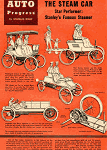 Steam-powered cars of yesteryear were the
equivalent of today's electric cars - they reached fairly respectable speeds, but
the range between refills wasn't very far. Side note: There were actually electric
cars in the early 1900s, but their underperformance made the steamers look like
marathoners. The Stanley Steamer is probably the most recognized steam-powered car.
Late night host and automobile aficionado Jay Leno features his totally restored
Stanley Steamer
on his Jay Leno's Garage website (click on thumbnail to visit his website). In
an edition of Popular Science a couple years ago, Jay reported on another of his
steam cars: The 1925 Doble once owned by Howard Hughes. Advantages of steam power
were many, including quite operation, no gear box, very few moving parts in the
engine, ease of manufacturing, great acceleration, and an operational efficiency
of around 90%. If OM (Obama Motors, formerly GM) gets wind of this, next year's
top tax-payer-subsidized car could be a steamer called the BTU... Steam-powered cars of yesteryear were the
equivalent of today's electric cars - they reached fairly respectable speeds, but
the range between refills wasn't very far. Side note: There were actually electric
cars in the early 1900s, but their underperformance made the steamers look like
marathoners. The Stanley Steamer is probably the most recognized steam-powered car.
Late night host and automobile aficionado Jay Leno features his totally restored
Stanley Steamer
on his Jay Leno's Garage website (click on thumbnail to visit his website). In
an edition of Popular Science a couple years ago, Jay reported on another of his
steam cars: The 1925 Doble once owned by Howard Hughes. Advantages of steam power
were many, including quite operation, no gear box, very few moving parts in the
engine, ease of manufacturing, great acceleration, and an operational efficiency
of around 90%. If OM (Obama Motors, formerly GM) gets wind of this, next year's
top tax-payer-subsidized car could be a steamer called the BTU...
 "California-based JetPack Aviation (JPA)
recently announced a world-first following the signing of an agreement to provide
JetPack pilot and maintainer training to a military customer in Southeast Asia.
This is the first time that professional JetPack training has been delivered to
a team of serving military personnel and represents a critical advancement in the
use of personal aerial vehicles for government use. Following the signing of an
$800,000 order for two JB12 JetPacks, the customer contracted JetPack Aviation to
train two pilots and two maintenance technicians at its California facility, with
future options to teach additional personnel, including an instructor. The student
pilots, already experienced military personnel but without flying experience, will
initially receive on-tether instruction, subsequently moving off-tether for advanced
training, following an FAA-approved syllabus created by JPA and the US Navy..." "California-based JetPack Aviation (JPA)
recently announced a world-first following the signing of an agreement to provide
JetPack pilot and maintainer training to a military customer in Southeast Asia.
This is the first time that professional JetPack training has been delivered to
a team of serving military personnel and represents a critical advancement in the
use of personal aerial vehicles for government use. Following the signing of an
$800,000 order for two JB12 JetPacks, the customer contracted JetPack Aviation to
train two pilots and two maintenance technicians at its California facility, with
future options to teach additional personnel, including an instructor. The student
pilots, already experienced military personnel but without flying experience, will
initially receive on-tether instruction, subsequently moving off-tether for advanced
training, following an FAA-approved syllabus created by JPA and the US Navy..."
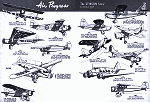 Most aviation enthusiasts, including moi,
think of the Reliant series of airplanes when the name Stinson is mentioned. Edward
"Eddie" Stinson was born in 1893 and at the time of his death due to an airplane
crash, he was the highest time pilot in the world with about 16,000 hours of logged
flight time. The Stinson Aircraft Company merged with Vultee Aircraft in 1932 and
was eventually bought out by the Piper Aircraft Corporation. Here is some interesting
trivia I discovered while researching this 1949 Air Trails magazine article: In
1943, Consolidated Aircraft and Vultee merged, creating Consolidated Vultee Aircraft
Corporation, popularly known as Convair. Convair (ConVAir) manufactured the F-106
Delta Dart, the B-36 Peacemaker bomber with six pusher propeller engines (and later
four jet engines), and also made that familiar XF Pogo vertical-takeoff-and-landing
(VTOL) airplane that had counter-rotating propellers and sat on its tail... Most aviation enthusiasts, including moi,
think of the Reliant series of airplanes when the name Stinson is mentioned. Edward
"Eddie" Stinson was born in 1893 and at the time of his death due to an airplane
crash, he was the highest time pilot in the world with about 16,000 hours of logged
flight time. The Stinson Aircraft Company merged with Vultee Aircraft in 1932 and
was eventually bought out by the Piper Aircraft Corporation. Here is some interesting
trivia I discovered while researching this 1949 Air Trails magazine article: In
1943, Consolidated Aircraft and Vultee merged, creating Consolidated Vultee Aircraft
Corporation, popularly known as Convair. Convair (ConVAir) manufactured the F-106
Delta Dart, the B-36 Peacemaker bomber with six pusher propeller engines (and later
four jet engines), and also made that familiar XF Pogo vertical-takeoff-and-landing
(VTOL) airplane that had counter-rotating propellers and sat on its tail...
 There is no doubt that Du−Bro set the stage
for commercially produced radio controlled (R/C) helicopters with the
Whirlybird 500.
Its use of a top-mounted engine that relied on counter-torque to set the main rotor
blades spinning was unique. There were a few published articles on homebrew free-flight
helicopters that used the arrangement, and Cox even marketed a ready-to-fly model
that had a Cox .020 engine mounted on top called the Sky Copter (I owned one as
a kid in the late 1960s). To my knowledge all other R/C helicopter models used a
gear or belt drive from the engine to the main rotor shaft. It is amazing that this
quite top-heavy configuration flew at all. Du−Bro engineers deserve a lot of credit.
Note extensive use of common Du−Bro products like wheel collars, pushrods... There is no doubt that Du−Bro set the stage
for commercially produced radio controlled (R/C) helicopters with the
Whirlybird 500.
Its use of a top-mounted engine that relied on counter-torque to set the main rotor
blades spinning was unique. There were a few published articles on homebrew free-flight
helicopters that used the arrangement, and Cox even marketed a ready-to-fly model
that had a Cox .020 engine mounted on top called the Sky Copter (I owned one as
a kid in the late 1960s). To my knowledge all other R/C helicopter models used a
gear or belt drive from the engine to the main rotor shaft. It is amazing that this
quite top-heavy configuration flew at all. Du−Bro engineers deserve a lot of credit.
Note extensive use of common Du−Bro products like wheel collars, pushrods...
 "The International Astronomical Union (IAU)
has announced details of its new IAU Centre for the
Protection of the Dark and Quiet Sky from Satellite Constellation Interference.
As the name suggests, it will be concerned with coordinating action to help mitigate
the impact of satellite constellations on ground-based optical and radio astronomy
observations. Specifically, it will coordinate 'collaborative multidisciplinary
international efforts with institutions and individuals and works across multiple
geographic areas.' The IAU has selected the SKA Observatory (SKAO) and the U.S.'s
NSF's (National Science Foundation) NOIRLab as co-hosts of the new IAU Centre..." "The International Astronomical Union (IAU)
has announced details of its new IAU Centre for the
Protection of the Dark and Quiet Sky from Satellite Constellation Interference.
As the name suggests, it will be concerned with coordinating action to help mitigate
the impact of satellite constellations on ground-based optical and radio astronomy
observations. Specifically, it will coordinate 'collaborative multidisciplinary
international efforts with institutions and individuals and works across multiple
geographic areas.' The IAU has selected the SKA Observatory (SKAO) and the U.S.'s
NSF's (National Science Foundation) NOIRLab as co-hosts of the new IAU Centre..."
 This article from the July 1973 issue of
American Aircraft Modeler magazine will be of great interest to the modern
e-power modeler who wants to get a feel for what the early pioneers in electric
powered aircraft we doing to forge the trail to today's highly powerful, brushless,
outrunner motors that use microprocessor-controlled electronic speed controls (ESCs).
Lithium-Polymer (Li-Po) and lithium ion (Li-Ion) batteries have almost completely
replaced the nickel cadmium (NiCad) and nickel-metal hydride (NiMH) batteries back
in the day. American Aircraft Modeler ceased publication in March of 1975, and is
no longer in print by the copyright owner, the Academy of Model Aeronautics (AMA)... This article from the July 1973 issue of
American Aircraft Modeler magazine will be of great interest to the modern
e-power modeler who wants to get a feel for what the early pioneers in electric
powered aircraft we doing to forge the trail to today's highly powerful, brushless,
outrunner motors that use microprocessor-controlled electronic speed controls (ESCs).
Lithium-Polymer (Li-Po) and lithium ion (Li-Ion) batteries have almost completely
replaced the nickel cadmium (NiCad) and nickel-metal hydride (NiMH) batteries back
in the day. American Aircraft Modeler ceased publication in March of 1975, and is
no longer in print by the copyright owner, the Academy of Model Aeronautics (AMA)...
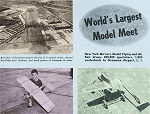 For what was probably one of the first major
model aircraft contests following the end of World War II, the New York Daily
Mirror's "Model
Flying and Air Fair" drew a thousand contestants and a quarter of a million
spectators to it Grumman Airport*, Long Island, venue. That gives you a good idea
of how popular not just full-scale, but model airplanes were in the era. People
were still fascinated with the concept of human flight, and the vast majority of
people worldwide had never flown on an airplane of any sort. Note in the aerial
view photo of the airport the huge number of cars - it's so obvious that it's easy
to miss. Note Lew Andrews, who later went on to manufacture model airplanes under
the name of AAMCo, was the Plymouth International Stunt Champion. One thing that
occurred to me when examining the model photos is how the basic form of the control
line speed model has not changed much over the decades... For what was probably one of the first major
model aircraft contests following the end of World War II, the New York Daily
Mirror's "Model
Flying and Air Fair" drew a thousand contestants and a quarter of a million
spectators to it Grumman Airport*, Long Island, venue. That gives you a good idea
of how popular not just full-scale, but model airplanes were in the era. People
were still fascinated with the concept of human flight, and the vast majority of
people worldwide had never flown on an airplane of any sort. Note in the aerial
view photo of the airport the huge number of cars - it's so obvious that it's easy
to miss. Note Lew Andrews, who later went on to manufacture model airplanes under
the name of AAMCo, was the Plymouth International Stunt Champion. One thing that
occurred to me when examining the model photos is how the basic form of the control
line speed model has not changed much over the decades...
 Featured here in the September 1949 issue
of Air Trails magazine are no fewer than 52 model aircraft (or boat or
car) engines on the market at the time. As with most items considered non-essential
that required critical resources (material and/or manufacturing capacity), the modeling
industry took a hit during the World War II years. Much print space was consumed
by tips and tricks for how to make your own components or substitute material for
what had been customary. Balsa was in short supply because it was (and still is)
used in the construction of air-dropped equipment pallets. Rubber, metal, plastic
(still relatively new at the time), and even some cloth and paper was often difficult
to procure for building or repairing models. Once the war was over, companies went
as fast as they could in converting from wartime production back to peacetime production... Featured here in the September 1949 issue
of Air Trails magazine are no fewer than 52 model aircraft (or boat or
car) engines on the market at the time. As with most items considered non-essential
that required critical resources (material and/or manufacturing capacity), the modeling
industry took a hit during the World War II years. Much print space was consumed
by tips and tricks for how to make your own components or substitute material for
what had been customary. Balsa was in short supply because it was (and still is)
used in the construction of air-dropped equipment pallets. Rubber, metal, plastic
(still relatively new at the time), and even some cloth and paper was often difficult
to procure for building or repairing models. Once the war was over, companies went
as fast as they could in converting from wartime production back to peacetime production...
 Being held from 1929 to 1961 (with the exception
of World War II years), the
Thompson Trophy Race was one of the longest running airplane speed events. The
closed course was 10 miles long and used 50-foot-high pylons. Through 1949 hen this
article appeared in Air Trails magazine, most events were held in Cleveland,
Ohio. Museum photos of many of the airplanes can be seen on Wikipedia. Looking through
the list of winners' names, the most recognizable to most people is Jimmy Doolittle,
famous for his air strike on the Japanese mainland using B-25 bombers launched from
the USS Hornet aircraft carrier. That was in 1942, but Doolittle won his Thompson
Trophy Race title in 1932, a full decade earlier... Being held from 1929 to 1961 (with the exception
of World War II years), the
Thompson Trophy Race was one of the longest running airplane speed events. The
closed course was 10 miles long and used 50-foot-high pylons. Through 1949 hen this
article appeared in Air Trails magazine, most events were held in Cleveland,
Ohio. Museum photos of many of the airplanes can be seen on Wikipedia. Looking through
the list of winners' names, the most recognizable to most people is Jimmy Doolittle,
famous for his air strike on the Japanese mainland using B-25 bombers launched from
the USS Hornet aircraft carrier. That was in 1942, but Doolittle won his Thompson
Trophy Race title in 1932, a full decade earlier...
 "AutoFlight, a Chinese eVTOL (electric
vertical take-off and landing) company, is set to accelerate its global expansion
by launching in Europe. Led by former Airbus manager Mark R. Henning, the Europe
team is establishing itself in Augsburg, Germany. Its first task will be to achieve
European Aviation Safety Agency (EASA) certification for AutoFlight's airtaxi 'Prosperity I,'
an eVTOL aircraft with a range of around 250km. Prosperity I sets up to three passengers
in addition to the pilot and the certification programme will begin this year, with
completion expected by 2025. Prosperity I is the company's first manned aircraft,
having previously focused on unmanned cargo drones. AutoFlight said that safety
is its 'top commitment,' and will be working closely with European authorities to
ensure its airtaxi is as safe as a commercial airliner..." "AutoFlight, a Chinese eVTOL (electric
vertical take-off and landing) company, is set to accelerate its global expansion
by launching in Europe. Led by former Airbus manager Mark R. Henning, the Europe
team is establishing itself in Augsburg, Germany. Its first task will be to achieve
European Aviation Safety Agency (EASA) certification for AutoFlight's airtaxi 'Prosperity I,'
an eVTOL aircraft with a range of around 250km. Prosperity I sets up to three passengers
in addition to the pilot and the certification programme will begin this year, with
completion expected by 2025. Prosperity I is the company's first manned aircraft,
having previously focused on unmanned cargo drones. AutoFlight said that safety
is its 'top commitment,' and will be working closely with European authorities to
ensure its airtaxi is as safe as a commercial airliner..."
 "The
fact that every part of this ship was built by the lowest bidder." That, according
to Gene Kranz (NASA Flight Director during the Gemini and Apollo missions), was
Alan Shepard's reply when asked what he thought about as he sat atop the
Mercury Redstone rocket*, waiting for liftoff. Shepard knew the boost vehicle,
the "Redstone," was originally designed as an expendable ballistic missile and not
for safely launching humans into space might have had something to do with it, too.
This 1957 vintage article (5 years prior to Shepard's flight), describes some the
electronics systems that were used in the program both onboard for stabilization
and on the ground for guidance. "A new type computer can solve in five minutes a
ballistic trajectory problem which would require a man more than a year to complete."
Today, a cellphone app can do it in less than a second... "The
fact that every part of this ship was built by the lowest bidder." That, according
to Gene Kranz (NASA Flight Director during the Gemini and Apollo missions), was
Alan Shepard's reply when asked what he thought about as he sat atop the
Mercury Redstone rocket*, waiting for liftoff. Shepard knew the boost vehicle,
the "Redstone," was originally designed as an expendable ballistic missile and not
for safely launching humans into space might have had something to do with it, too.
This 1957 vintage article (5 years prior to Shepard's flight), describes some the
electronics systems that were used in the program both onboard for stabilization
and on the ground for guidance. "A new type computer can solve in five minutes a
ballistic trajectory problem which would require a man more than a year to complete."
Today, a cellphone app can do it in less than a second...
 Here is a short story about French flying
ace Pierre Clostermann who, after his country capitulated to the German Wehrmacht,
went to England to fly for the Royal Air Force (RAF). It appeared in the March 1962
issue of American Modeler magazine. His service for the French resistance
was spent downing German Focke-Wulfs, Junkers, and Messerschmitts - 23 confirmed
kills, 5 "probables," and 30 aircraft damaged. His fabled aircraft was a
Hawker
Tempest, sister craft to the beautiful Hawker Hurricane. This control line model
is designed for a .60 size engine. A separate full construction article for the
Hawker Tempest was also published in this issue.... Here is a short story about French flying
ace Pierre Clostermann who, after his country capitulated to the German Wehrmacht,
went to England to fly for the Royal Air Force (RAF). It appeared in the March 1962
issue of American Modeler magazine. His service for the French resistance
was spent downing German Focke-Wulfs, Junkers, and Messerschmitts - 23 confirmed
kills, 5 "probables," and 30 aircraft damaged. His fabled aircraft was a
Hawker
Tempest, sister craft to the beautiful Hawker Hurricane. This control line model
is designed for a .60 size engine. A separate full construction article for the
Hawker Tempest was also published in this issue....
 The
term "drone"
these days for most invokes the image of a little plastic spider-looking thing with
propellers mounted at the ends of the arms - usually with a toothless bumpkin at
the controls. Those same people often think drones are relatively new devices. People
with a just a little more information automatically classify all radio control (R/C)
models, be they traditional fixed-wing aircraft or helicopters, as drones. Pilots
of the aforementioned models are even likely, per observers, to have all their teeth
and bathe regularly. I happen to be one of the latter type R/C modelers and while
I no longer possess all 32 teeth I had at birth, I do bathe regularly. Drones have
been around since World War I where they were used for target practice by ground-based
marksmen. Once radio remote control became practical, adopting it for use in pilotless
aerial platforms was a natural evolution. I have written in the past about what
a large contribution hobbyists have made to "drone" technology both through their
technical prowess and flying ability... The
term "drone"
these days for most invokes the image of a little plastic spider-looking thing with
propellers mounted at the ends of the arms - usually with a toothless bumpkin at
the controls. Those same people often think drones are relatively new devices. People
with a just a little more information automatically classify all radio control (R/C)
models, be they traditional fixed-wing aircraft or helicopters, as drones. Pilots
of the aforementioned models are even likely, per observers, to have all their teeth
and bathe regularly. I happen to be one of the latter type R/C modelers and while
I no longer possess all 32 teeth I had at birth, I do bathe regularly. Drones have
been around since World War I where they were used for target practice by ground-based
marksmen. Once radio remote control became practical, adopting it for use in pilotless
aerial platforms was a natural evolution. I have written in the past about what
a large contribution hobbyists have made to "drone" technology both through their
technical prowess and flying ability...
 If
you are familiar with aircraft electronic navigation systems, reading in this 1951
Radio−Electronics article's opening paragraph about how "Omnirange
aircraft navigation will make air travel safe, dependable, and predictable regardless
of visibility, and volume of air traffic," really makes you realize how far we have
come in the last seven decades. The network VOR (VHF Omnidirectional Range) station
revolutionized aviation by enabling precision navigation using relatively simple,
reliable, and inexpensive equipment in the cockpit which enables pilots to fly from
waypoint to waypoint across the country. Eventually, five variations of VOR evolved
with ranges going from 25 nautical miles (~29 statute miles) up to 130 nm. The addition
of TACAN (TActiCal Air Navigation) provided slant distance information to or from
the VORTAC station. Since the introduction of full precision GPS, when the U.S.
government unclassified the "P-code"... If
you are familiar with aircraft electronic navigation systems, reading in this 1951
Radio−Electronics article's opening paragraph about how "Omnirange
aircraft navigation will make air travel safe, dependable, and predictable regardless
of visibility, and volume of air traffic," really makes you realize how far we have
come in the last seven decades. The network VOR (VHF Omnidirectional Range) station
revolutionized aviation by enabling precision navigation using relatively simple,
reliable, and inexpensive equipment in the cockpit which enables pilots to fly from
waypoint to waypoint across the country. Eventually, five variations of VOR evolved
with ranges going from 25 nautical miles (~29 statute miles) up to 130 nm. The addition
of TACAN (TActiCal Air Navigation) provided slant distance information to or from
the VORTAC station. Since the introduction of full precision GPS, when the U.S.
government unclassified the "P-code"...
|



